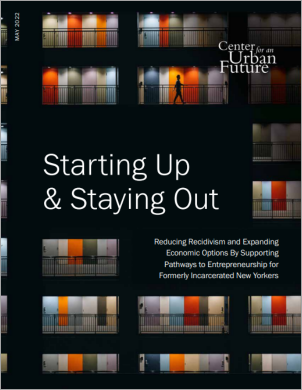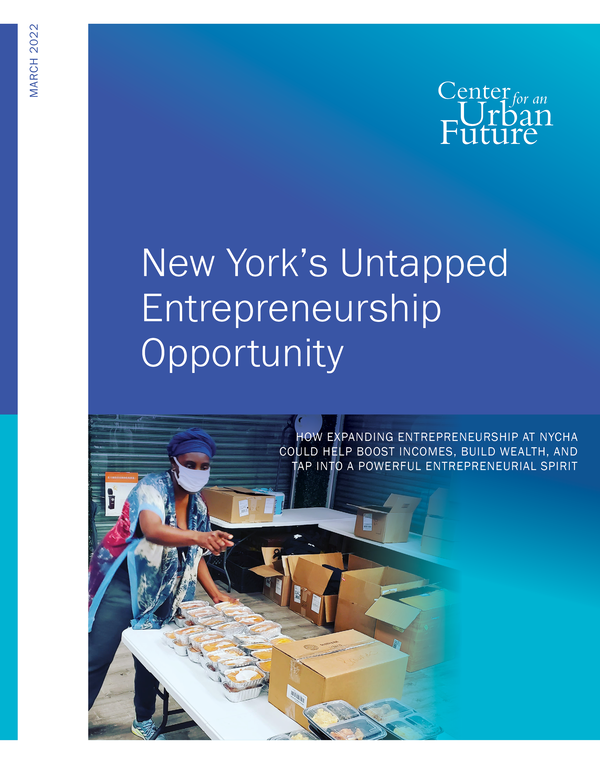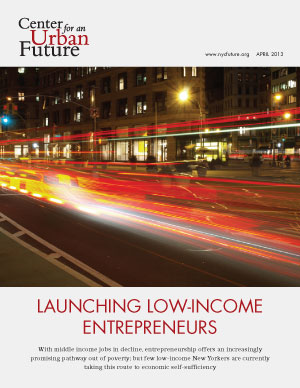Recommendations to Spark and Support Reentry Entrepreneurs in New York City
Provide entrepreneurial training and support to 2,500 justice-involved New Yorkers by 2026. Entrepreneurial education and support can help many more returning citizens achieve financial self-sufficiency and avoid future justice involvement at a time when well-paying jobs are often out of reach. Reentry entrepreneurship initiatives present a vital opportunity to build alternative pathways to economic opportunity while contributing to wealth generation in communities affected by high incarceration rates. Even for those who decide they are not ready to take the risk of starting a business, entrepreneurship training leads to increased employment earnings and significantly lower recidivism rates. Yet minimal public investment has been focused on expanding reentry entrepreneurship training. To realize this opportunity, Mayor Adams should direct the Department of Small Business Services to launch an entrepreneurship training program for formerly incarcerated New Yorkers, integrate entrepreneurship training into reentry and diversion initiatives, relaunch entrepreneurial education programming on Rikers Island, and set a five-year goal of providing 2,500 returning New Yorkers with entrepreneurial education over the next four years, backed by a $2.5 million investment.
Deploy start-up grants to reentry entrepreneurs and partner with community development financial institutions (CDFIs) to expand access to microloans and technical assistance. Formerly incarcerated New Yorkers overwhelmingly come from lower-income backgrounds and have little to no access to the friends-and-family funding that is instrumental in getting a business off the ground. To help overcome this start-up barrier, city leaders should work with private funders to provide $1,000 microgrants to returning entrepreneurs, potentially as part of a citywide business plan competition. Grants of just $1,000 would help reentry entrepreneurs register their business, cover licensing fees, and help with the purchase of inventory or equipment without getting into debt. The Department of Small Business Services should also tap into the expertise of the city’s Community Development Financial Institutions, which have unmatched expertise in connecting underserved entrepreneurs with affordable capital and making loans that other financial institutions deem too risky, but rarely work with reentry entrepreneurs. To realize this opportunity, SBS should launch a competitive grant program designed to enable CDFIs to partner with reentry-focused organizations—coupling the expertise of CDFIs with the existing networks and relationships of providers in the reentry ecosystem.
Offer entrepreneurship training through the city-funded Alternatives to Incarceration program. Over the past decade, the city has boosted funding for Alternatives to Incarceration programs operated by nonprofit partner organizations and successfully diverted thousands of New Yorkers from unnecessary jail time. But to date, none of the 24 city-funded ATI programs provide entrepreneurship training or business start-up assistance. Mayor Adams should direct MOCJ to include entrepreneurial education among ATI program offerings and direct funding to local small business development organizations to create ATI programs specifically for justice-involved New Yorkers interested in pursuing entrepreneurship.
Launch a city-funded business incubator specifically designed for reentry entrepreneurs. Start-up incubators, popular in the tech sector, provide entrepreneurs with the time, space, resources, and connections they need to transform a promising business idea into revenue-generating enterprise. In effect, incubators provide businesses with growth potential the supportive services they need to thrive. The city should fund a reentry entrepreneur incubator that combines traditional, wraparound reentry services—including supportive housing, counseling, health care, and family services—with entrepreneurial education, office or commercial space, Internet and computer access, and industry connections. Through a competitive application process, the program would provide the winners of a reentry business plan competition with time, space, and a stipend so that they can devote themselves to growing their business, and structure the program so that their participation fulfills court-ordered employment requirements.
Greatly expand entrepreneurship training in state prisons. Today, just two of 50 New York State prisons provide access to entrepreneurship training programs. City and state leaders should work with entrepreneurship training organizations to expand entrepreneurial education to ten correctional facilities in the next two years, with a goal of reaching every facility in the state by 2026. Experts universally agree that business training programs are most effective when they begin in prison, where incarcerated individuals have more time to devote to coursework and developing a business plan and few of the challenges that come with returning to their communities, such as finding employment and housing, or accessing benefits and health care. Earlier access to classes on business negotiation, money management, and digital skills also give participants an advantage when they’re released, whether they decide to start businesses or find jobs. Entrepreneurial education in prisons can also help dramatically improve recidivism rates. For instance, graduates of the Texas-based Prison Entrepreneurship Program experienced an 8 percent recidivism rate, compared to a state average of 40 percent.
Ramp up the availability of credit-bearing entrepreneurship programs for incarcerated New Yorkers through Second Chance Pell. Even though college-level courses are offered at more than half of New York State prisons, access to courses on starting a business is limited. But with the reinstatement of federal Pell Grants for all incarcerated individuals in late 2020, New York has a significant opportunity to leverage increased funding for prison higher education to massively expand access to credit-bearing business and entrepreneurship programs. The Second Chance Pell program is expanding to include three additional SUNY schools and three CUNY schools including the Borough of Manhattan Community College (BMCC) alongside North Country Community College, which participated in the program pilot and has offered an associate of applied science (AAS) in entrepreneurship management to incarcerated individuals since 2016. New York policymakers should seize this opportunity to enable far more incarcerated New Yorkers to access coursework in highly regarded entrepreneurship programs offered by New York City’s public colleges, including BMCC’s AAS in small business–entrepreneurship and LaGuardia Community College’s business management program.
Fully integrate entrepreneurial supports and technical business assistance into city-funded reentry services, including Jails to Jobs. Entrepreneurship training has been shown to greatly reduce recidivism and provide formerly incarcerated individuals with a valuable pathway to financial stability at a time when a well-paying job is hard to come by. Yet despite increased funding for reentry services as part of the city’s Jails to Job initiative, city-funded programs do not include program offerings tailored to the needs and interests of aspiring business owners. Mayor Adams should build on his commitment to expanding transitional employment and supportive services by launching new programs focused on entrepreneurship, financial literacy classes, and technical business assistance—so that returning New Yorkers can access another vital pathway to economic stability.
Pass legislation to automatically seal and expunge criminal records. Formerly incarcerated New Yorkers are routinely prevented from starting a business because of their criminal record. The widespread use of background checks excludes people with convictions from accessing loans, licenses, and business insurance for which they would otherwise qualify. Mayor Adams should work with the New York State Legislature and Governor Hochul to champion the passage of legislation that would automatically seal and expunge certain convictions, removing the third-party background check as an additional barrier to economic opportunity for formerly incarcerated individuals who have already paid their debt.
Make New York’s marijuana business licensing requirements more inclusive of formerly incarcerated New Yorkers. New York State’s plan to issue its first 100 recreational marijuana sales licenses to formerly incarcerated individuals is a major step forward, but officials should reexamine the barriers to entry in its eligibility requirements and boost commitments to inclusivity. First, instead of requiring two years of profitable business ownership, applicants should only have to demonstrate business knowledge or be willing to work with a business partner who has previous experience. Business knowledge could be displayed through relevant credentials, professional references, or could be earned through enrolling in a business training program offered through a nonprofit small business assistance organization, CDFI, or public library. In addition, rather than only committing to prioritizing the first 100 licenses to individuals or family members of individuals with past marijuana convictions, state regulators should commit to an ongoing prioritization of these applicants by setting aside at least 25 percent of annual licenses to social and economic equity applicants. Additionally, expanding the definition of a family member in the context of the application could benefit a larger network of affected people. Under current guidance, an related applicant has to be a child/dependent, spouse, or parent of a New Yorker with a marijuana conviction—siblings, cousins, and domestic partners are not included. Finally, the state should waive the $2,000 application fee for formerly incarcerated applicants.
Leverage branch libraries to expand access to digital literacy and entrepreneurship programs for newly released New Yorkers in neighborhoods with high rates of justice involvement. New Yorkers who return to the city after serving lengthy prison sentences often lack the digital skills that are a prerequisite to accessing services, support, and economic opportunities today—whether the goal is landing a job or starting a business. Because branches are located in every neighborhood, including those most affected by the justice system, libraries can reach formerly incarcerated New Yorkers with a unique mix of services. The city, though, has not provided consistent funding for library services catering to the reentry population. Mayor Adams and the City Council should invest in the capacity of the three library systems to provide integrated digital literacy and career-entrepreneurship exploration for New Yorkers recently released from state prisons and city jails. Through these programs, aspiring entrepreneurs then can get access to additional library resources and connections to local, community-based business assistance and economic development organizations.
Expand in-prison, tablet-based business and finance education courses. Everyone held in New York State correctional facilities has access to tablets that can be loaded with course materials, but the tablets have not been used to provide access to entrepreneurship training. The Brian Hamilton Foundation’s Starter U, a free online course in starting and growing a business, was made accessible to incarcerated individuals in North Carolina via tablets through a partnership between a private communications company and the foundation. The tablets in use in DOCCS facilities, however, do not have Internet capability. To overcome this situation, New York State DOCCS should work with training providers operating in the state and nationally to develop offline materials and pilot the deployment of Internet-enabled devices. Policymakers should consider legislation to mandate these new services and fund technology investments to ensure that all incarcerated New Yorkers can access synchronous remote learning opportunities while in prison.






